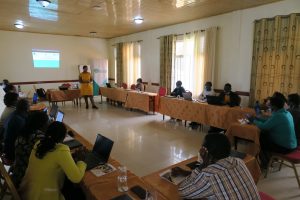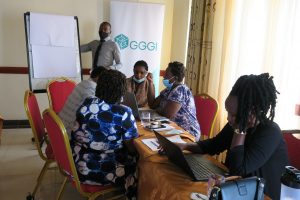The Gender Equality and Social Inclusion (GESI) Training Workshop took place from the 12th -14th October 2021 in one of the satellite cities Muhanga in Southern province of Rwanda with objectives of providing the participants with basic gender knowledge to challenge their own understanding of GESI ; GESI analysis skills they need for understanding GESI concepts at national, sub-national and household levels ; and unpacking GESI components in their respective institutional cultures. The training workshop was organized in collaboration with the Rwanda Environment Management Authority (REMA) as the National Designated Authority (NDA) for Green Climate Fund (GCF) in Rwanda and participants with staff from Muhanga, Huye, Kamonyi and Rusizi districts, Ministry of Emergency Management (MINEMA),Ministry of local government (MINALOC), Rwanda Transport Development Agency (RTDA), Rwanda Environment Management Authority (REMA), Rwanda Water Board, Gender Monitoring Office, City of Kigali, Rwanda Womens Network, Green Fighters, Young Water Professionals, Rwanda Green Fund (FONERWA), HORECO, Meteo Rwanda, Rwanda Land Management and Use Authority (RLMUA) and IDEA Rwanda.

The training workshop was organized to achieve the following outcomes:
• Understanding Gender Equality and Social Inclusion definitions and Concepts
• Understanding Policy, legal and institutional frameworks underpinning GESI in Environment and Climate change in Rwanda
• Knowledge on Gender responsive Budgeting
• Understanding the different contexts shaping GESI
The Gender Equality and Social Inclusion training workshop was a critical component of achieving one of the 4 outcomes of the GCF NAP Readiness and Preparatory support for building Flood Resilience Capacities in Rwanda and Global Green Growth Institute (GGGI) has been nominated to serve as the Delivery partner by the National Designated Authority (NDA) i.e Rwanda Environment management Authority (REMA) and the Accredited Entity (AE) i.e., Ministry of Environment (MoE) of Rwanda to the Green Climate fund (GCF) to achieve the following outcomes:
Outcome 1: Capacity and coordination strengthened for main institutions to effectively mitigate floods and prevent landslides.
Outcome 2: Appropriate technical studies identified and prioritized, climate finance strategies and project pipeline strengthened for effective storm water and landslide management in Kigali City and urban areas experiencing rapid growth and highly vulnerable to floods and landslides outside Kigali city.
Outcome 3: Knowledge management, information sharing and communications strengthened to effectively mitigate floods and prevent landslides.
Outcome 4: Mechanisms for Reporting, Monitoring and Review of adaptation and resilience planning progress developed to gather lessons and integrate them into future iterations of the identified flood mitigation and landslide management planning process.
As a critical component of achieving Outcome 1, The Gender Equality and Social Inclusion (GESI) assessment of stakeholders was conducted to provide an understanding of the current status of capacities and structures supporting GESI in the areas of floods and landslides. Capacity needs were identified, and a series of capacity building sessions were proposed. It is in this framework that the GESI training workshop was targeted for key staff of stakeholder institutions at national and district level that were consulted during the GESI assessment.
In his opening Remarks, REMA Senior Officer, who therefore called upon for active and collaborative participation to achieve the desired overall outcome of strengthening coordination and capacity in building flood resilience across the Country.

One of the participants explained how the training workshop will be useful in developing green growth policies and investments by highlighting that “this training has inspired me in advocating and creating investment related to waste to energy recycling since it will engage many people of different categories and provide energy to vulnerable groups.” And proposed to organize a knowledge sharing session where different institutions will share their GESI activities then discuss on ways of improvement by explaining that “when we learn in a group without being specific to your institution, you might get limited in the contribution of GESI in your institution performance due to limited thinking or exploration”
Majority of the participants said that the training was very interesting and according to the agenda the period of the training was very short and proposed to have more trainings on GESI and further more such trainings to be provided to decision-makers, local authorities as they believe that top-down approach can be possible. It was highlighted that capacity building is still needed to ensure that different institutions have a better understanding of the Gender based aspects. It was further pointed out that some institutions don’t know that they need that capacity, and it would be better for high level institutions to support by engaging with all institutions and creating awareness of this need for such trainings to be done.

After the completion of the training workshop ,way forward will be for the GESI Expert to consider providing inputs in the finalization of the GESI report and for GGGI and REMA to consider provided recommendations for further workshops.